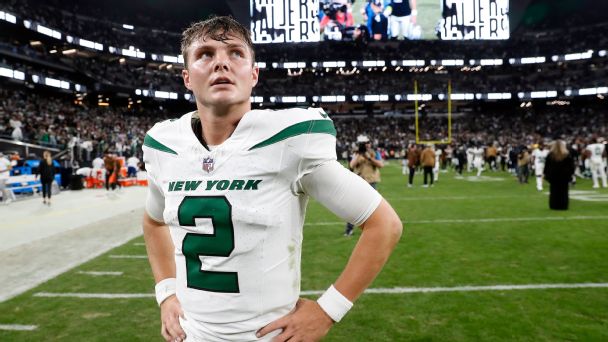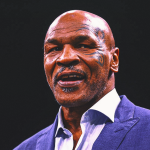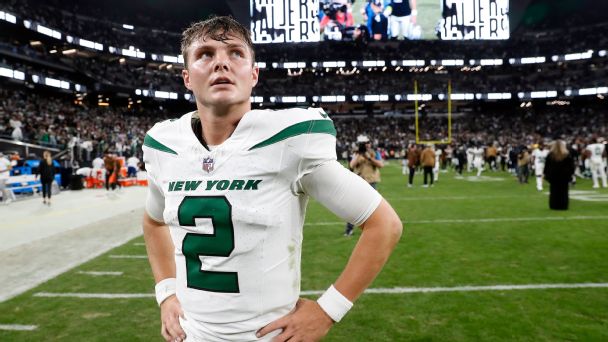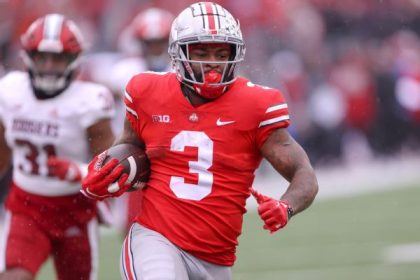
FLORHAM PARK, N.J. — How did it get this bad?
First, a quick history lesson on the New York Jets: Since 2011, the start of their active playoff drought, no team has produced fewer points or yards than the Jets, who have been undermined by a revolving door of failed quarterbacks and offensive coordinators.
So what’s happening now — only eight touchdowns in nine games, none in the past 11 quarters — isn’t exactly a sudden downturn. Except for one productive season in 2015, which could be termed a cadaveric spasm, the Jets have been lifeless on offense for more than a decade.
But it doesn’t mean the current situation is merely a byproduct of past sins. No, a unique set of circumstances has contributed to the slump, which includes the worst touchdown rate (7.6% of their drives) the NFL has seen since 2006.
“Obviously, it’s not the Greatest Show on Turf,” coach Robert Saleh said, referencing the high-scoring St. Louis Rams offenses from 1999 to 2001.
This was supposed to be a new chapter in offensive football for the Jets, but Aaron Rodgers‘ left Achilles injury in Week 1 flipped everything upside down. For four months, they built everything around the future Hall of Fame quarterback, who left the field without having completed a pass.
Still, the NFL is all about change and adjusting on the fly, as the Minnesota Vikings have done quite nicely — managing to go undefeated in games without either quarterback Kirk Cousins or star wide receiver Justin Jefferson starting. Meanwhile, the Jets are avoiding the end zone as if it’s a hazmat area.
So back to the original question: How did it get this bad? Let’s focus on a series of personnel decisions, starting last January:
A commitment to Zach Wilson. When last season ended, general manager Joe Douglas made it clear he wasn’t ready to give up on his highest-drafted player (No. 2 overall in 2021). Despite two unproductive seasons by Wilson, ranked 33rd out of 34 quarterbacks in Total QBR for 2021-22, Douglas said “we’re going to do everything we can to ultimately help Zach reach his full potential here.” In a backup role, he meant.
Once they landed Rodgers, the Jets sold the idea that it was the perfect mentor-pupil situation, with Rodgers fueling the narrative with his unabashed support of Wilson. It was one of the main storylines in the “Hard Knocks” reality show over the summer. Then the real reality hit when Wilson actually had to play.
Still inconsistent, Wilson has failed to galvanize the offense. He has just five touchdown passes, including only one in the past five games — and that was a 1-yard checkdown that sprung for 50 yards. This season, Wilson ranks 30th in QBR out of 32 qualifying quarterbacks.
Douglas appears to have miscalculated by entrusting the No. 2 job to an unproven player. There were plenty of veteran backups available in the offseason, including Gardner Minshew, Jacoby Brissett and Jameis Winston. The Jets had one in Mike White, but he opted to leave via free agency once he knew Wilson wasn’t going anywhere.
GMs can be stubborn when it comes to protecting their draft picks. Douglas has said he doesn’t want the Jets to be known as a team that gives up too early on talent. The decision to ride with Wilson, even after the Rodgers injury, could haunt the franchise.
“He’s much better than he was a year ago,” said Saleh, who has remained steadfast in his support of Wilson.
The hiring of offensive coordinator Nathaniel Hackett. While Hackett was hired based on his own merits, according to Saleh, his close ties to Rodgers — who was acquired in a trade with the Green Bay Packers after Hackett was hired — obviously factored into the decision. Hackett and Rodgers were good together in Green Bay, with Rodgers winning the MVP in 2020 and 2021. The Jets’ plan was to recreate that magic.
Without Rodgers, Hackett’s offense looks lost. They’re averaging fewer points per game and fewer yards per game last season under former coordinator Mike LaFleur — 16 points and 283 yards in 2023, down from 17.4 points and 318 yards in 2022.
Not only have they been unproductive, they’ve been sloppy with a league-high 15 offensive penalties over the last three weeks.
“Unbelievably frustrating,” Hackett said of the overall struggles.
A revamped receiving corps. After last season, the Jets jettisoned pretty much every receiver not named Garrett Wilson. They released Braxton Berrios and traded Elijah Moore, who wanted out, replacing them with Allen Lazard, Mecole Hardman Jr. and Randall Cobb. Lazard and Cobb were Rodgers/Hackett guys from Green Bay; Hardman was an outsider.
None of the additions have worked out.
Hardman fell to the bottom of the depth chart and was traded. Cobb was unproductive as the slot receiver (three catches for 20 yards) and gradually replaced by undrafted rookie Xavier Gipson. Cobb was a healthy scratch in the last two games. Lazard, still in a full-time role while dealing with a knee injury, has disappointed; he has three drops, four penalties and ranks 76th out of 98 qualified wide receivers in yards per route (2.06).
Things are so rough that some fans are wishing for Corey Davis, who left the team in the preseason, to come out of retirement.
Neither Moore nor Berrios is shining with their new teams, but that doesn’t change the Jets’ current plight: They don’t have a strong WR2, making it difficult for Wilson to have advantageous matchups.
Despite tying a career high with nine catches in Sunday night’s 16-12 loss to the Las Vegas Raiders, Wilson appeared more dejected than ever after the game.
“I don’t know what y’all want me to say,” he said. “I’m tired of this. I want to play better. The whole offense wants to play better. We’ve been saying what we’ve been trying to do. We come out every week trying to make it happen. It’s frustrating.”
Not enough offensive line help. Despite major line issues last season, Douglas made no significant additions at tackle in the offseason. He opted to stand pat at left tackle, believing Duane Brown, 38, would rebound from offseason shoulder surgery. Given his age and the severity of his rotator cuff injury, it was a considerable gamble.
And it backfired.
By his own admission, Brown rushed back from his rehab, got off to a slow start and landed on injured reserve in Week 3 with a hip injury. He remains on IR; the Jets must activate him by the end of the week or else his season is over.
Brown’s injury resulted in Mekhi Becton being switched to left tackle, starting a chain of moves that has left the line vulnerable in multiple areas. Other injuries, most notably a torn Achilles for guard/tackle Alijah Vera-Tucker, have weakened the line to the point where they rank 22nd and 26th in run and pass block win rate, respectively, per ESPN Stats & Information.
The “biggest source of frustration,” Douglas said, is “keeping guys healthy, not only at the offensive line, but all across the board.”
A defensive pick in the first round. Despite obvious needs on offense, the Jets drafted to their strength, selecting defensive end Will McDonald with the 15th pick. McDonald has struggled to get on the field — playing just 76 snaps on defense — in part, because of a deep defensive line rotation. They passed on three receivers who are producing as rookies — Jaxon Smith-Njigba (Seattle Seahawks, 20th), Zay Flowers (Baltimore Ravens, 22nd) and Jordan Addison (Minnesota Vikings, 23rd).
Perhaps it would’ve turned out differently if the Pittsburgh Steelers hadn’t traded up for tackle Broderick Jones (14th). The Jets would’ve been in position to draft Jones at 13, but they swapped first-round picks with the Green Bay Packers as part of the Rodgers trade.
Bottom line: The Jets can’t score.
“It’s a lot of the same things hurting us every week,” Rodgers said Tuesday on “The Pat McAfee Show,” “but if you don’t get the ball in the end zone, you’re not going to win many games.”












